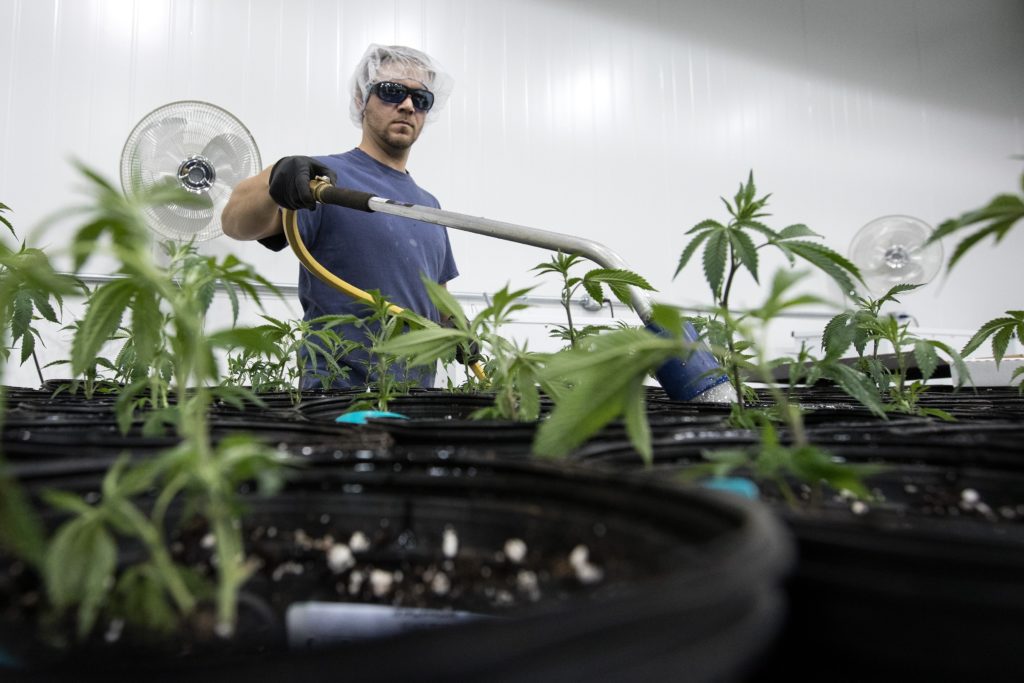The Canadian Veterinary Medical Association (CVMA) along with other members of the animal health and welfare community, met with Health Canada Wednesday to discuss the future of medical cannabis for pets.
These public consultations which have been described as roundtable discussions are designed to shed light on the potential benefits and drawbacks of allowing Canada’s veterinarians to prescribe cannabis to animals.
“[The CVMA doesn’t] have a position on these products per se,” said Shane Renwick, Manager of National Issues and Animal Welfare in an interview with Marijuana.com. “We’re aware that there’s lack of research and a lot of unknowns about the nature of potential products, and certainly how components of these products would be useful in animals. We [also] realize there’s a lot of potential.”
Renwick added that the CVMA is organizing a national forum next summer to discuss cannabinoid medicine for pets or “companion animals” as they call them. “We will have a discussion with a number of experts, and a lot of our membership will be there as well to discuss things.”
Although the CVMA has not offered an official stance on medical cannabis, it’s evident that cautiousness is a factor in their outlook. “We’re concerned about lack of research as I mentioned, we are also concerned about potential toxicity. When products do get legalized in Canada and are available to people, will animals be exposed, inadvertently, to products that may be toxic to them?” he said.
Despite the careful approach the association is taking toward cannabis, the private sector in Canada is already developing products that contain derivatives of the plant. Once such manufacturer is True Leaf Medicine based out of British Columbia.
In 2015, the company founded True Leaf Pet to create “hemp-focused products for the pet industry.” True Leaf is also in the process of obtaining a Health Canada license to produce cannabis.
Darcy Bomford is the CEO of True Leaf and he sat down with Marijuana.com to share his thoughts on the future of cannabis as nutrition and medicine for animals.
“We market and sell hemp seed-based supplements for pets,” said Bomford. “There’s three formulations. One is for hip and joint function, one is for calming, and one is for immune and heart support. All three formulas contain hemp seed oil and hemp seed powder.”
Bomford added that because his company is currently using hemp seed as opposed to the leaf, his products are legal in Canada and the United States.
Just like some veterinarians who believe medicinal cannabis should be allowed, Bomford is in full support of cannabinoid medicine for pets.
“Definitely there are some benefits and more research is needed. THC for example, from what we have seen, has a much larger effect on dogs than humans so you have to be really careful,” said Bomford. “But the CBD component of hemp or perhaps marijuana if it’s in lower doses, would be helpful.”
Another organization that was on-hand for Wednesday’s roundtable discussions with Health Canada is the Canadian Association of Veterinary Cannabinoid Medicine (CAVCM). This group is comprised of various members of the veterinary community who support cannabinoid research and medicine for animals.
“We are a national, non-profit corporation founded by a group of veterinary professionals,” said Dr. Sarah Silcox, President & Director of the CAVCM in an interview with Marijuana.com. “[We] help guide legislation changes that would ensure veterinarians have fair access to appropriate cannabis products. We are also really interested in collaborating with groups who are conducting species-specific cannabis-based studies, on the safety [and] dosing indications for cannabinoid veterinary medicines.”
Silcox went on to add that the group was created “out of necessity” because the veterinary industry is “seeing a rapid growth in the interest [for medical cannabis].”
Although Silcox clearly respects her colleagues at the Canadian Veterinary Medical Association for being cautious on the topic, she believes a group like hers is necessary to push the discussion along further.
The importance of the topic at hand is not simply because more evidence is being revealed regarding the incredible uses for medical cannabis, but also because cannabis is about to be legal and available to all adult Canadians. Inevitably, if veterinarians do not have access to cannabinoid medicine, some owners will try to administer cannabis on their own in the hopes that it will help a variety of conditions. Further, some pets will undoubtedly ingest cannabis products by accident, as they do with any number of other items, and it is important for veterinarians to understand how to address those situations appropriately.
For the record, Silcox is one doctor who strongly feels medical cannabis products can help the pet community. “There’s overwhelming anecdotal reports of animals having benefits,” she said. “I think we have to be cautious about how we go about using that, but there’s incredible potential for its healing properties. We are just waiting for the clinical studies to catch up with what we already know.”
credit:marijuana.com












